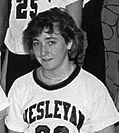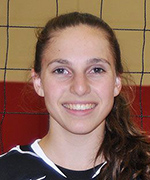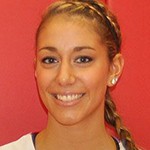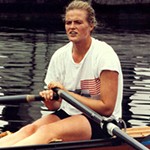Alumnae Athletes Share Their Stories
All of the following women were Jones Award winners—women who represent the very best of Wesleyan athletics. Here are a few of their stories:

At Wesleyan, Christina Fedolfi ’90 (soccer) played soccer for four seasons, basketball for one season, and rugby for two seasons. “During these seasons, I made my lifelong friends- women who were dedicated, smart and fun. Athletics always provided structure to my college life- I knew I had to carve out time for my academics once practice and games were over. Playing sports made me a better student. I had my sports time and my academics time. I am trying to instill this in my kids today.”
Joanna Buffington ’81 (soccer) says she loved being part of the first varsity women’s team (after being club status for two years). “Being elected captain two years in a row (first year there were 4, second just 1) by my peers meant so much to me, as it clearly wasn’t because I was the most talented player. It was (I believe) because I had the biggest mouth and was constantly yelling encouragement and advice from all over the field (and off). Apparently my teammates thought that was helpful. Since playing soccer and running track at Wesleyan, I have managed to continue to play organized sports — I currently play pick-up Ultimate Frisbee, and am the oldest (by about 30 years) female to participate. I could be the grandmother of some of these kids. At least the more polite young men have stopped calling me ‘Maam.’
Here’s hoping to play for another 20 years.”

Kate Centofanti ’14 (volleyball) attributed her smooth transition into Wesleyan to the group of powerful women who guided her and gave her advice. “My team became my family in a sense, because I would “come home” to them every day of the fall when we would practice, and of course we would spend a lot of time together in the off-season, working out and growing closer as a unit by spending time outside of the court.”
Despite going through tremendous changes in her life after graduating from Wesleyan, the one constant in her life was volleyball. “I made friends in Philadelphia by playing beach over the summer at Drexel, and through them started in a league with a couple of people who I now consider myself to be close with. I haven’t stopped playing a single season since I graduated. The power of sports connections has really come through in a lot of respects for me.

Samantha LaCroce ’12 (basketball) stated that participating in Cardinal basketball brought out the best in her. “It always pushed me to become the best version of myself and never to settle. As a team member, I learned early on the importance of responsibility, accountability, and compassion. Others were always relying on me. It could have been as simple as making a layup during a practice drill, or as complex as being there for teammate going through a difficult time, but regardless of the situation I had to step up. As a captain, I learned the true meaning of leadership, which went far beyond the confines of Silloway Gymnasium. I don’t necessarily remember all the wins or losses, but I do remember the amazing experiences I had with my team on and off the court, which have helped shape the person I am today. “
Amy Robins ’90 (rowing) was back on campus this past May for her 25th college reunion. “The first thing I did when I got back to Middletown was bring my husband and two kids (ages 7 and 10) to the boathouse for the dedication of a new crew shell. I wanted my kids to tour the boathouse, touch the equipment, meet the coach and see the river where I had spent so many hours. I wanted them to meet my teammates and the other women rowers who came together that day. At the dedication, I was asked to say a few words. I hadn’t been in a boat for years but I was honored to represent my team and my generation of women rowers. It was a powerful experience to stand on the banks of the river connecting my past with my present and realize how much pride I still have in my identity as a rower.”

During college, Robins’ housemates thought “I was crazy for getting up so early in the morning, spending so much time away on the weekends competing and for having an endless stream of sore muscles, bruises, bloody hands and stinky clothing. There were daily sacrifices of time hanging out with friends and other pursuits. But I couldn’t imagine it any other way. Crew taught me big lessons about commitment, discipline, hard-work, humility, grace, the importance of laughing and the true joy of being part of something bigger than me. It was through crew that I learned that leadership was not about being the fastest or the strongest or any other ‘est.’ Being a leader was about showing up every day, bringing your best self and inspiring others to do the same. In college, we were focused on the pursuit of the perfect row – the race when everything would come together in the exact right way. But after college, these same lessons apply albeit perhaps a bit further from the river.
Today, I don’t get up quite so early and don’t spend as much (or even enough) time on physical pursuits. Yet I am a committed member of two very important teams – my family and my work. Balancing motherhood with a challenging career is not for the feint of heart. Because of rowing, I know what I am capable of and what I can expect of myself – I have tested myself time and time again. I don’t always or even usually hit it perfectly – life is messy! But I will come back to those lessons, the hours spent on the river and I will try again.”

In high school, after an extensive search for a girls’ team, Lynne Mehlman ’84 (ice hockey) joined the Coventry Girls Soccer Club. One summer, her team traveled to Canada to play in an international tournament. “I distinctly remember seeing older women’s teams, where some of the players were mothers and they had their children watching them play. This extremely empowering image stayed with me,” she said.
Later, at Glastonbury High School, Mehlman and her friends attended a school committee meeting and requested a formal high school girls’ soccer team. Because of Title IX, they were successful and began the girls soccer team their senior year.
“At Wesleyan, there were many athletic opportunities. The women’s ice hockey team needed players and since I had really missed playing soccer the fall of my freshman year (due to a knee injury), I joined the team. Even though I had no prior ice hockey experience, the team welcomed me and I absolutely loved the sport. Daily practice improved my skills over the years. I continued playing soccer every fall after my freshman year and my senior year we founded the Wesleyan women’s rugby club. Wesleyan athletics gave me some of my best friends and many wonderful memories. I learned a great deal about being a team player, what it takes to learn a new sport, and how to be an effective leader. Being a co-captain of three teams while at Wesleyan also helped me when applying for jobs after graduation.”
Mehlman continued to play soccer for many years, even after having two children. “Memories of women playing soccer with their children on the sidelines became my reality! Community based athletics turned out to be a fantastic way to meet many different types of women, with various backgrounds, who came together because of a love of the sport. The women I met while playing soccer became my closest friends.”
Mehlman says coaching was a natural extension of her love of athletics and enabled her to spend some wonderful, quality time with her children and their friends. “It also gave me a deeper appreciation for some of the good coaching that I had received in the past. The opportunities available for my young daughter were astounding compared to the opportunities that I had to fight for when I was her age.”
“My knees aren’t good enough to play soccer anymore, so I participate in Crossfit which enables me to stay fit so that I can continue to work long days as an artist, painting, in my studio. Furthermore, since I am almost always alone when painting, at the end of the day I can go to a Crossfit class and find that special camaraderie and support that athletics have provided me my whole life.”

Amy Baltzell ’87 (crew) played basketball her first year at Wesleyan and rowed crew all four years. “Sport was a place to be loved, to learn to appreciate my body and to belong. Through rowing I learned to push myself, beyond what I dreamed possible. Rowing was a source of pure, healthy passion. I was so fit that I could use a long run to clear my mind, center myself in the swirl of the exciting, challenging collegiate experience. I also joined the guys most mornings at the crack of dawn in the weight room whenever I possibly could. I loved the feeling of getting stronger and pushing my body to the limit. At Wesleyan, it was accepted to be oneself no matter what that meant. For me it meant being someone who studied hard and trained harder. Sport was an anchor for me then, and ironically, still is.”
After college Baltzell rowed for the U.S. team for a few years and made the 1992 Olympic Rowing Team. She was a member of the first (and only) all women’s America’s Cup Sailing Team and competed in the 1995 events. Shortly after her sailing adventure, Baltzell went back to school and earned a PhD in counseling, with a specialization in sport psychology. Now she runs a graduate program in sport psychology, works with athletes as a sport psychologist and writes books on the topic including Living in the Sweet Spot: Preparing for Performance in Sport and Life and Mindfulness and Performance. “Most importantly sport at Wesleyan taught me to value my health, my body and to identify as an athlete. I proudly can still do a mean set of pushups, can hold a handstand and most proudly I can cradle my 12-year-old son in my arms (while he laughs) — and he weighs 130 pounds!”

Being on a team in college gave Zabette Macomber ’88 (crew) a place to belong. “When I arrived at Wesleyan, I wasn’t sure about what I wanted to do or who I really wanted to be. Everyone around me seemed so confident and I felt awkward, slightly over my head and unsure. But when I entered the boat house and met the other women rowers, I knew I belonged. Not only did the women on my team, and especially in my boat, give me the courage and confidence to figure out who I was and what I wanted, they opened my eyes to the world around me. I met women who had different backgrounds, different ideas, and different ways of being in the world. And those remarkable athletes gave me the gift of power. Power to know what I want, the power of humor, of asking questions, of belonging. I loved my team. And even though I haven’t rowed in 23 years (how is that possible?), I still, to this day, identify myself as a rower. A very powerful rower. So tell those aspiring young athletes to jump in and get ready!”

Erin Hardy ’01 (cross country, track and field) Excellence. Community. Friendship.
According to Hardy, these three words sum up the profound impact being a student-athlete had on her time at Wesleyan and every day since. Hardy was a three-sport athlete, playing soccer in the fall of her freshman and sophomore years, and running track in winter/spring. She ran the 1000 meter (indoor), the 800 and 1500 meter (outdoor), and “had the great joy” of being on the middle-distance relay teams. During her junior year, Hardy decided to start running year-round, so she started running cross country in the fall seasons. “I felt this was what it would take to try to get to nationals by senior year (this happened and was one of the best experiences of my life!) and to contribute as much as I could to the team,” she said. Hardy also served as captain her junior and senior years.
“Excellence. As a student-athlete at Wesleyan, I was surrounded by teammates who I respected so much and that could push one another to achieve things that no one expected. I remember looking up to my captains so much as a freshman, both on and off the field—I reveled at how hard they worked at balancing sports and academics, all while managing to have fun and experience college to the fullest. These “Wes” women were tough nuts and I wanted to fill those “big-shoes” as an upperclass(wo)man. Most importantly, I learned what it meant to truly pursue excellence, to have the drive and discipline to chase down my dreams. I look back at what I accomplished as an individual, and what we accomplished as a team (winning NESCAC’s my senior spring), and just say WOW.
Community. Being a scholar-athlete is challenging–hitting the books, hitting the trails, hitting the sheets early enough to be fresh for the next day of academics and sports. But what I loved was just being at Freeman or walking to dinner after practice or riding the bus home after games/meets – there was such an incredible community of scholar athletes around me, and there was just so much mutual support and respect that made you feel proud to be part of the scholar-athlete community at Wesleyan. I found myself seeking this type of community after leaving Wes. Since leaving 15 years ago, I have had the amazing pleasure of meeting some of the most wonderful friends and people through running clubs and my current mom’s workout group, “MAMA BEAST” – which lives up to the name. Since Wes, I have enjoyed being part of the “grown-up” scholar (worker!) athlete community – connecting with other working women and moms, who are finding time in their crazy-busy lives to pursue athletic endeavors, because it matters so much. Since Wes, I have run a marathon, competed in an Olympic distance triathlon, and have won local bragging rights by winning a number of local road races.
Friendship. My best friends at Wesleyan were all teammates. We lived together. We studied together. We sweated together. We cried together after big losses. We beamed together after beating Williams and Amherst. The bonds formed on the field/track, are so strong. I am still in wonderful touch with all of my close friends (and see one every day, as I am married to an ex Wes-hockey player), and they are the best people that I know on this earth. They are friends for life and inspire me every day to challenge myself – I wouldn’t trade my time on the field or the track at Wesleyan for anything.”
Now Hardy is a mother to a little girl, who is just starting her athletic journey. “I have had the joy of coaching her in soccer, watching her build the foundations of skill, confidence and friendship that she will take with her on her way. For all of you young women on your own athletic journey, play hard, believe in yourself, and make sure you are having fun. As we used to say at Wes, ‘GO HARD OR GO HOME.'”

